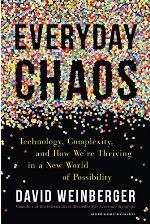BOOK REVIEW
 Book Title: Everyday Chaos: Technology, Complexity, and How We’re Thriving in a New World of Possibility
Book Title: Everyday Chaos: Technology, Complexity, and How We’re Thriving in a New World of Possibility
Author: David Weinberger
Publisher: Harvard Business Review Press
List Price: $30.00 USD
Format: Hardback, 256 pages
Publication Date: 2019
ISBN: 9781633693951
Reviewer: Sheila Renee Jackson, PMP
Review Date: October 2019
Introduction
This is a philosophical work; a book written by a thinker for thinkers. How are we to navigate an increasingly complex world? How useful are the principles and laws we’ve been told govern our universe? How do we explain events and bring meaning to our lives? Everyday Chaos is the author’s exploration of such questions, observations, possibilities, and potentials. Along the way he displays his impressive academic credentials and cites extensive literary sources. Each chapter is interwoven with historical anecdotes and thematic insights, and concludes with a “coda”, an essay about “how these changes are affecting some of the most basic formations of our understanding.”
How will machine learning, artificial intelligence, and technology alter our understanding of ourselves? In his introduction, Weinberger encourages us to embrace our disillusionment. “We are at the beginning of a great leap forward in our powers of understanding and managing the future: rather than always having to wrestle our world down to a size we can predict, control, and feel comfortable with, we are starting to build strategies that take our world’s complexity into account.”
Overview of Book’s Structure
The book consists of an introduction and seven chapters.
Intro: Everything All at Once
- The Evolution of Prediction
- Inexplicable Models
- Beyond Preparation: Unanticipation
- Beyond Causality: Interoperability
- Strategy and Possibility
- Progress and Creativity
- Make. More. Meaning.
Weinberger’s sense of informational and organizational design is evident in the book’s introduction where he explains how the book works, laying out his aim, plan, structure. He also addresses what he calls the book’s “oddness”, as he concludes chapters with brief essays (codas) that he hopes give some indication of the depth and breadth of change.
Each chapter is progressive, building on one another, in refining essential ideas and introducing new variables. He introduces core philosophical schools and concepts, historic taxonomies, and the presumptions upon which our sources of truth operate. Weinberger walks us through a history of how early cultures explained events and predicted future ones. He traverses Homer, Isaac Newton, scientific theory, existentialism, rationality, post-modernism, and the advent of technology and chaos theory. Each chapter advances that thinking forward, so I suggest not skipping; it’s all required reading.
More…
To read entire Book Review, click here
About the Reviewer

Sheila Jackson, MBA, PMP, PSM
North Texas, USA
![]()
Sheila Jackson, MBA, PMP, PSM has more than sixteen years of project management experience, in multiple industries and settings. Sheila serves as Senior Program Manager – Lifelong Learning at the national office of the American Heart Association. Sheila has an MBA from the University of North Texas and a BA in Psychology from Baylor University in Waco, Texas.
Editor’s note: This book review was the result of a partnership between the publisher, PM World and the PMI Dallas Chapter. Authors and publishers provide the books to PM World; books are delivered to the PMI Dallas Chapter, where they are offered free to PMI members to review who agree to provide a review within 45 days; book reviews are published in the PM World Journal and PM World Library.
If you have read a good recently-published book related to managing programs, projects or teams of professionals, consider authoring a book review for publication in the PM World Journal. For our standard format or for more information, contact Editor@pmworldjournal.com or visit https://pmworldlibrary.net/book-review-program/
If you are an author or publisher of a project management-related book, and would like the book reviewed through this program, please contact Editor@pmworldjournal.com.









